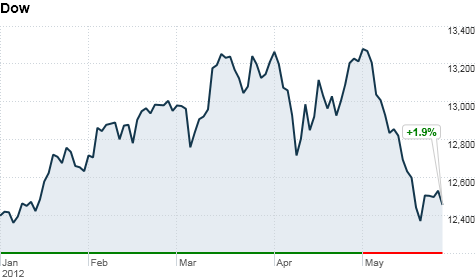
The Dow is down almost 6% in May and headed for its worst monthly loss since November 2011. Click the chart for more stock market data.
NEW YORK (CNNMoney) -- Memorial Day may mark the unofficial start to summer, but investors won't be getting any rest and relaxation during the coming week.
Following a three-day weekend (U.S. markets are closed Monday for Memorial Day), uncertainty will continue to swirl over Europe, with the threat of Greece leaving the eurozone still looming.
Worries over Greece's future and the broader region's debt problems have already triggered deep losses in U.S. stocks and international markets this month. The S&P 500 (SPX) and Dow (INDU) are down almost 6% in May, and headed for their worst monthly losses since November 2011. In fact, the Dow has only been up four days so far this month. The only other time the Dow had a month with just four advancing days was September 1903.
Meanwhile, the Nasdaq (COMP) has tumbled almost 7% and is on track for its worst monthly performance in two years.
U.S. markets will continue to be driven by the situation in Europe, especially in the weeks leading up to Greece's June 17 elections, said Tom Schrader, managing director at Stifel Nicolaus. Until that date, investors will keep close tabs on polling results and comments from European leaders.
If Greece ends up with a coalition government led by the leftist Syriza party, which is currently leading the polls, chances are good that Greece will be forced to exit the eurozone.
Syriza party leader Alexis Tsipras has denounced the country's austerity measures that are a condition of Greece's bailout deal. While EU leaders say they want Greece to remain in the eurozone, they also stress that the nation must abide by the terms of its bailout agreement.
The growing risk of a Greek exit also raises concerns about the ramifications for Italy and Spain, said Schrader. Spanish banks are already in the spotlight, with Spain's fourth-largest bank, Bankia, asking the nation's central bank for ?19 billion to recapitalize itself.
Later in the week, focus will shift to the U.S. economy, as investors parse through a deluge of economic data, including four different readings on the job market, as well as a reading on manufacturing activity and auto sales figures.
The most important number will come in the Labor Department's May jobs report before the opening bell on Friday.
Economists are forecasting that 155,000 jobs were added in May. While that would be an improvement over the measly 115,000 jobs added in April and the 154,000 in March, the pace is still weak compared to job gains in the previous three months, each of which exceeded 200,000. The unemployment rate is expected to hold steady at 8.1%.
"If the jobs number doesn't come in above expectations, that will raise some red flags," said Schrader. A lack of more robust jobs growth could push the country into a somewhat mild recession, he added.
Schrader will be keeping a close eye on oil prices, as the energy market telegraphs how the broader economy is doing, he said.
Crude oil prices have tumbled more than 13% during the last month, trading around $91 a barrel. Last week, oil prices dipped below $90 a barrel for the first time since November.
"A lot of people like when oil and gas prices fall, but that's a negative for the economy, so you have to be careful what you wish for," said Schrader.?![]()
First Published: May 27, 2012: 7:35 AM ET
reason rally mad hatter azerbaijan ryan howard ps i love you ray charles cheney heart transplant
No comments:
Post a Comment
Note: Only a member of this blog may post a comment.